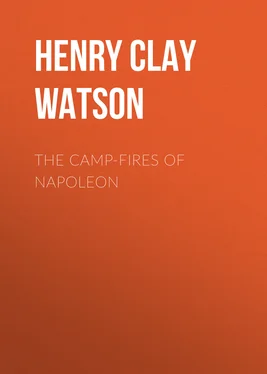Henry Clay Watson - The Camp-fires of Napoleon
Здесь есть возможность читать онлайн «Henry Clay Watson - The Camp-fires of Napoleon» — ознакомительный отрывок электронной книги совершенно бесплатно, а после прочтения отрывка купить полную версию. В некоторых случаях можно слушать аудио, скачать через торрент в формате fb2 и присутствует краткое содержание. Жанр: foreign_prose, foreign_antique, на английском языке. Описание произведения, (предисловие) а так же отзывы посетителей доступны на портале библиотеки ЛибКат.
- Название:The Camp-fires of Napoleon
- Автор:
- Жанр:
- Год:неизвестен
- ISBN:нет данных
- Рейтинг книги:4 / 5. Голосов: 1
-
Избранное:Добавить в избранное
- Отзывы:
-
Ваша оценка:
- 80
- 1
- 2
- 3
- 4
- 5
The Camp-fires of Napoleon: краткое содержание, описание и аннотация
Предлагаем к чтению аннотацию, описание, краткое содержание или предисловие (зависит от того, что написал сам автор книги «The Camp-fires of Napoleon»). Если вы не нашли необходимую информацию о книге — напишите в комментариях, мы постараемся отыскать её.
The Camp-fires of Napoleon — читать онлайн ознакомительный отрывок
Ниже представлен текст книги, разбитый по страницам. Система сохранения места последней прочитанной страницы, позволяет с удобством читать онлайн бесплатно книгу «The Camp-fires of Napoleon», без необходимости каждый раз заново искать на чём Вы остановились. Поставьте закладку, и сможете в любой момент перейти на страницу, на которой закончили чтение.
Интервал:
Закладка:
The fact was that the victory of Lodi had a great influence upon Napoleon’s mind. He afterwards acknowledged, that neither the quelling of the sections at Paris, nor the victory of Monte Notte made him regard himself as any thing superior, but that after Lodi, for the first time, the idea dawned upon him, that he should one day be “a decisive actor,” on the stage of the political world. It was Lodi which gave birth to the 18th Brumaire.
THE CAMP-FIRE AT CASTIGLIONE
It was at Castiglione and in its vicinity that the wonderful spirit and rapidity of Napoleon’s movements were more fully displayed than at any other of his scenes of victory in Italy. The aged Beaulieu had been superseded in the command of the Austrian army, by General Wurmser, a commander of high reputation. His army was greatly superior in numbers to that of Bonaparte. It descended from the Tyrol during the last days of July, in three divisions, commanded by Davidowich, Quasdanowitch, and Wurmser himself.
Wurmser, confident in his numbers, and calculating upon the absorption of the energies of the French army, by its endeavors to subdue Mantua, disposed his forces in the most admirable way to improve a victory; never reflecting that he might happen to be defeated. Untaught by all the previous disasters of Beaulieu, he committed the error of dividing his army, in order to cover an extent of country. His right wing was detached, with orders to occupy Brescia, and cut off the retreat of the French in the direction of Milan: his left wing was to descend the Adige, and manœuvre on Verona; while the centre, under his own command, advanced to raise the siege of Mantua. During the two first days of his approach, the French generals, after resisting to the utmost, yielded up successively, Rivoli, Brescia, and Salo; but these two days were sufficient to make Napoleon master of the plan on which Wurmser proposed to carry on the campaign, and he instantly disconcerted the whole of it, by a movement so unlike that of any ordinary general, as to defy all calculation.
In one night, (31st July,) he raised the siege of Mantua; sacrificing the whole of his artillery. The men were employed to destroy as much as the time would allow. They spiked the guns, burnt the carriages, threw the powder into the lake, and buried the balls. Augereau and Massena were stationed to defend the line of the Mincio as long as possible. Before morning the whole French army had disappeared from Mantua, and Napoleon was hurrying forward to attack the right wing of the Austrian army, before it could effect a junction with the central body of Wurmser.
The Austrian right wing was advancing in three divisions. Napoleon defeated one division at Salo, and another at Lonato. At the same time, Augereau and Massena, leaving a sufficient number of men at their posts to maintain a defence, or at least to impede the enemy, marched upon the third division at Brescia; but it had already fled in disorder towards the Tyrol. The French generals instantly countermarched to the support of their rear-guards, which had been forced by the Austrians.
Wurmser reached Mantua and was astonished to find what he believed to be a precipitate flight. He entered the city in triumph—but he was completely deceived. (August 2nd.)
Bonaparte did not halt for a moment. His troops had been constantly on the march, he had himself been all the time on horseback; he resolved to make them fight the very next morning. He had before him Bayalitsch at Lonato, and Liptai at Castiglione, presenting to both of them a front of twenty-five thousand men. He had to attack them before Wurmser should return from Mantua. Sauret had for the second time abandoned Salo; Bonaparte sent Guyeux again thither to recover the position, and to keep back Quasdanowitch. After these precautions on his left and on his rear, he resolved to march forward to Lonato with Massena, and to throw Augereau upon the heights of Castiglione, which had been abandoned on the preceding day by General Vallette. He broke that general at the head of his army, in order to make his lieutenants do their duty without flinching. On the following day, the 16th (August 3rd,) the whole army was in motion; Guyeux re-entered Salo, and this rendered any communication between Quasandowitch and the Austrian army still more impracticable. Bonaparte advanced upon Lonato; but his advanced guard was beaten back, some pieces of cannon were taken, and General Pigeon was made prisoner. Bayalitsch, proud of this success advanced with confidence, and extended his wings around the French division. He had two objects in performing this manœuvre; in the first place, to surround Bonaparte, and in the second, to extend himself on the right for the purpose of entering into communication with Quasandowitch, whose cannon he heard at Salo. Bonaparte, not alarming himself about his rear, suffered himself to be surrounded with imperturbable coolness; he placed some sharp-shooters on his exposed wings, and next took the 18th and 32d demi-brigades of infantry, ranged them in close column, gave them a regiment of dragoons to support them, and rushed headlong upon the enemy’s centre, which was weakened by its extension. With this brave body of infantry he overthrew all before him, and thus broke the line of the Austrians. The latter, divided into two bodies, immediately lost their courage: one part of the division of Bayalitsch fell back in all haste towards the Mincio; but the other, which had extended itself in order to communicate with Quasandowitch, was driven towards Salo, where Guyeux was at that moment. Bonaparte caused it to be pursued without intermission, that he might place it between two fires. He let loose Junot in pursuit of it, with a regiment of cavalry. Junot dashed off at a gallop, killed six horsemen with his own hand, and fell, having received several sabre wounds. The fugitive division, entrapped between the corps at Salo and that which was pursuing it from Lonato, was routed, and lost at every step thousands of prisoners. During this successful pursuit, Bonaparte proceeded on his right to Castiglione, where Augereau had been fighting ever since the morning with admirable bravery. The heights on which Liptai’s division had placed itself had now to be carried. After an obstinate combat, several times renewed, he had at length accomplished his object, and Bonaparte on his arrival found the enemy retreating on all sides. Such was the battle called the battle of Lonato, fought on the 16th (August 3rd.)
This battle produced considerable results. The French had taken twenty pieces of cannon and three thousand prisoners from the division cut off and driven back upon Salo, and they were still pursuing its scattered remnant in the mountains. They had made a thousand or fifteen hundred prisoners at Castiglione, and killed or wounded three thousand men; they had alarmed Quasandowitch, who finding the French army at Salo, and hearing it in the distance at Lonato, thought that it was every where. They had thus nearly disorganized the divisions of Bayalitsch and Liptai, which fell back upon Wurmser. That general at this moment came up with fifteen thousand men to rally the two beaten divisions, and began to draw out his lines in the plains of Castiglione.
Bonaparte now determined upon fighting a decisive battle upon the ground which the Austrian general had chosen, but as it was necessary to collect all his disposable force at Castiglione, he deferred the action until the 5th.
It was the night of the 4th of August. The weather had been excessively warm for several days, and the troops were almost exhausted by their rapid marches under a burning sun. The hostile armies were encamped close in front of each other, vertically from the line of the heights on which both supported one wing, Bonaparte having his left thereon, and Wurmser his right. A series of heights formed by the last range of the Alps extends from Chiessa to the Mincio, by Lonato, Castiglione and Solferino. At the foot of these heights was the plains on which the great battle was to be fought. Bonaparte had at most twenty-two thousand men, Serrurier’s division not having come up yet; and, indeed, it had been ordered to make an effort to gain the rear of the Austrians. Wurmser had thirty thousand men under his command, and the wing of his army which was on the plain was supported by a redoubt placed upon the elevation of Medolano. It was a clear, warm night. The stars were thickly sprinkled in the arching heaven, but there was no moon, and the position of each army could only be clearly distinguished by the light of the lines of watch-fires, stretching away from the foot of the heights. In the rear of the Austrians, the low wall, and tower of the old town of Castiglione could be distinguished, forming a looming and shadowy background to a striking and imposing picture.
Читать дальшеИнтервал:
Закладка:
Похожие книги на «The Camp-fires of Napoleon»
Представляем Вашему вниманию похожие книги на «The Camp-fires of Napoleon» списком для выбора. Мы отобрали схожую по названию и смыслу литературу в надежде предоставить читателям больше вариантов отыскать новые, интересные, ещё непрочитанные произведения.
Обсуждение, отзывы о книге «The Camp-fires of Napoleon» и просто собственные мнения читателей. Оставьте ваши комментарии, напишите, что Вы думаете о произведении, его смысле или главных героях. Укажите что конкретно понравилось, а что нет, и почему Вы так считаете.












